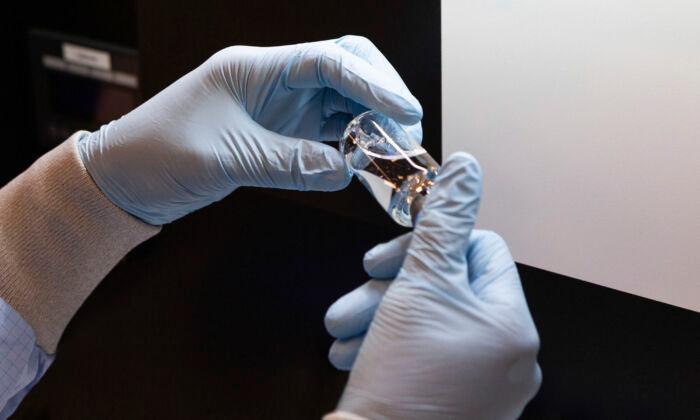Federal health officials said some vials of remdesivir have already been sent to seven states, with plans to soon ship to five more.
Indiana, Massachusetts, New Jersey, New York, Rhode Island, Tennessee, and Virginia received between seven and 565 cases of the drug earlier this week, the Department of Health and Human Services (HHS) said Saturday. New York got the most because it has the most confirmed CCP virus cases and hospitalizations in the nation.
The process of shipping to five other states was finalized, the department said.
Iowa will receive 10 cases, Maryland and Connecticut will each get 30 cases, Michigan will receive 40 cases, New Jersey will receive another 110 cases, and Illinois will get 140 cases.
Each case contains 40 vials of the drug. Drugmaker Gilead Sciences recently announced plans to donate some 1.5 million doses to governments around the world, including approximately 607,000 vials to the United States.

State health departments will distribute remdesivir vials from the federal government to hospitals.
Patients receiving the doses must have COVID-19 and be on ventilators or oxygenation or require supplemental oxygen, health officials said.
Shipments to other states are planned for the future but haven’t been finalized as of yet.
Press Secretary Kayleigh McEnany told reporters on Friday that Dr. Deborah Birx, a member of the White House Coronavirus Task Force, would serve as one of the chief consultants on where remdesivir will be distributed.
Birx is “the person who’s constantly reviewing the numbers, constantly reviewing the data,” McEnany said. “And she really has the best grasp as to how that should be distributed.”

The initial supply will be “very limited,” Abramowitz said, noting that the 1.5 million doses translate into a 5- or 10-day course of treatment for 140,000 patients.
Gilead, based in California, said last month it was donating the 1.5 million doses. It also said teams have been ramping up production since January.
A separate study, run by the company itself, indicated a five-day regimen could be as effective as a 10-day regimen, “which could significantly expand the number of patients who could be treated with our current supply of remdesivir,” Gilead Chief Medical Officer Dr. Merdad Parsey said.

Fact Sheets
The suggested dose for adults and children on ventilators is a single dose of 200 milligrams infused intravenously over 30 to 120 minutes on the first day followed by daily doses of 100 milligrams for the next nine days, according to a fact sheet (pdf) distributed by the Food and Drug Administration (FDA) for healthcare providers administering the drug.Patients not on ventilators should get a similar regimen but only for five days total, the agency said. The treatment may be extended for up to five additional days if the patient doesn’t show clinical improvement.
According to the American Society of Health-System Pharmacists, the optimal dosage and duration of treatment is not known.
“There is limited information known about the safety and effectiveness of using remdesivir to treat people in the hospital with COVID-19,” the fact sheet stated. There are no treatments approved as safe and effective against COVID-19 but remdesivir received an emergency use authorization, they were told.
Possible side effects include low blood pressure, vomiting, nausea, sweating, and shivering. Patients could also see an increase in levels of liver enzymes.
“These are not all the possible side effects of remdesivir. Remdesivir is still being studied so it is possible that all of the risks are not known at this time,” the FDA stated. “Not a lot of people have taken remdesivir. Serious and unexpected side effects may happen.”
Patients mulling not taking the investigational drug were told, “If you do not take remdesivir, you might get sicker or even die.”
Even if they do take it, there’s still a chance they may get sicker or die, the sheet added.





